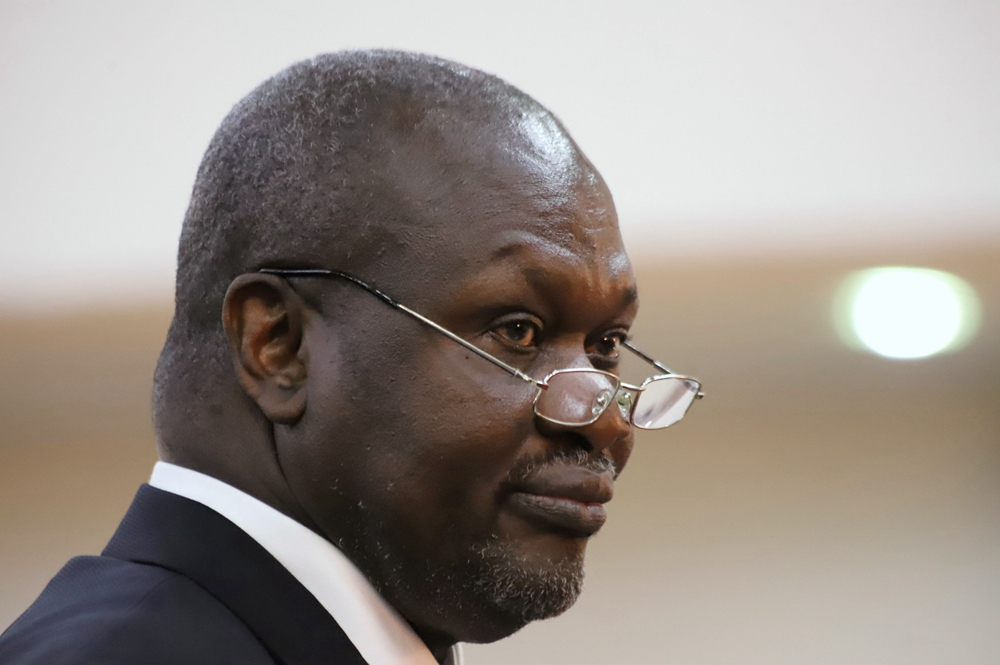02:12

South Sudan leaders vowed to unite the country as the new transitional unity government was formed on Saturday.
President Salva Kiir and First Vice President Riek Machar called on South Sudanese to forgive one another and join efforts to unite the country and rebuild the war-torn country ravaged by more than six years of conflict.
"This [swearing-in] action signifies the official end of the war and we can now declare a new dawn in South Sudan. Peace has come to stay, not to be shaken ever again in this nation," Kiir said after the swearing-in ceremony of four vice presidents administered by Chief Justice Chan Reech Madut in Juba.
Machar was sworn in as the first vice president along with Taban Deng Gai, James Wani Igga and Rebecca Garang as vice presidents.
"I do hereby swear that I shall be faithful and bear diligence to the Republic of South Sudan," Machar said in his oath in a ceremony which was attended by representatives from the international community.
Read more:
South Sudan sacks 40 diplomats over absenteeism
One slot of vice president from the South Sudan Opposition Alliance and cabinet members of the unity government are yet to be announced due to differences within the group.
Kiir said the formation of the transitional unity government means that peace has come to South Sudan and is "irreversible."
"I want to reiterate here that I have forgiven my brother, Dr. Riek Machar. I also ask for his forgiveness and I want to ask all South Sudanese people to forgive each other and reconcile," said the president.
He appealed to Nuer and Dinka, the two major rival ethnic communities who have been fighting for many years, to forgive and reconcile with one another.
"I also appeal to the people of Equatoria, especially those who have experienced much of the devastation, to forgive and reconcile. I want no more bloodshed in South Sudan, and I hope I speak for all of my deputies," Kiir said.

South Sudan's First Vice President Riek Machar takes the oath of office at the State House in Juba, South Sudan, February 22, 2020. /Reuters
South Sudan's First Vice President Riek Machar takes the oath of office at the State House in Juba, South Sudan, February 22, 2020. /Reuters
The newly formed transitional unity government, which is expected to run for three years under the revitalized peace deal, will now have to embark on reforms to pave the way for general elections.
In his remarks, Machar expressed his determination to work with Kiir and other peace partners to ensure full implementation of the peace deal.
"I want to assure you that we will work collectively to end your suffering. I reiterate my commitment to work closely with President Kiir to implement the agreement in letter and spirit," said Machar.
He exuded confidence that the formation of the revitalized transitional government will create a new momentum and a new spirit of commitment and cooperation in the implementation process of the agreement in order to avoid the delays experienced during the pre-transitional period.
"I would like to reiterate my commitment and the commitment of the SPLM/A-IO to work closely with the peace partners and particularly President Kiir Mayardit to implement the agreement in letter and spirit," he added.
Read more:
China donates rice, anti-malaria drugs to South Sudan
The two leaders had agreed to resolve outstanding issues including security arrangements after the formation of the unity government.
Other outstanding issues include the process of integrating tens of thousands of former rival forces into a united army.
Under the 2018 revitalized peace deal which was signed in Ethiopia, the government and opposition groups are tasked with establishing a unified national army to avoid a repeat of the violence that destroyed the 2015 peace agreement.
Saturday was the third deadline for the formation of the unity government, which was agreed upon in a peace deal brokered in Addis Ababa, Ethiopia, following talks between the two rivals groups.
The parties failed to form the unity government in May last year, prompting an extension until November 12, 2019, which also passed without progress, and they later on agreed to the February 22 deadline.
South Sudan descended into conflict in December 2013, after President Salva Kiir sacked his deputy Riek Machar leading to fighting between soldiers loyal to the respective leader.
A peace agreement signed in 2015 collapsed following renewed violence in July 2016 which forced Machar to flee the capital.

South Sudan's Second Vice President James Wani Igga, Third Vice President Taban Deng Gai and Fourth Vice President Rebecca Garang attend their oath taking ceremony at the State House in Juba, South Sudan, February 22, 2020. /Reuters
South Sudan's Second Vice President James Wani Igga, Third Vice President Taban Deng Gai and Fourth Vice President Rebecca Garang attend their oath taking ceremony at the State House in Juba, South Sudan, February 22, 2020. /Reuters
Bring the hope
The East African bloc and the UN refugee agency welcomed the formation of a long-awaited unity government in South Sudan on Saturday, bringing political rivals together to work for lasting peace.
In separate statements, UNHCR and the Inter-Governmental Authority on Development (IGAD) urged regional and international partners to redouble their efforts in supporting the visions and aspirations of the people of South Sudan.
"The new government revives hope for a peaceful future for the people of South Sudan, who are suffering the consequences of this prolonged conflict," UN High Commissioner for Refugees Filippo Grandi said in a statement.
He said the peace agreement has brought hope to the world's youngest nation, which remains Africa's largest humanitarian and refugee crisis with 2.2 million South Sudanese refugees and 1.46 million internally displaced.
(With input from Xinhua)